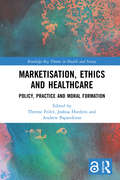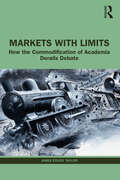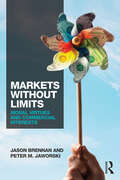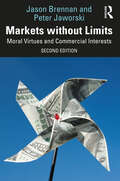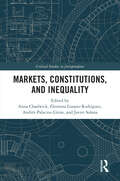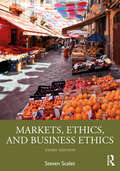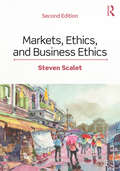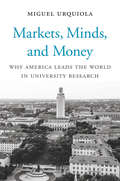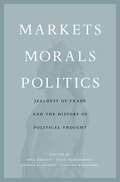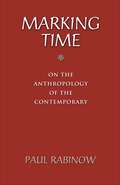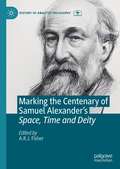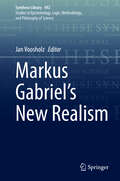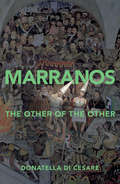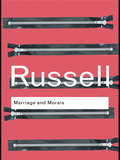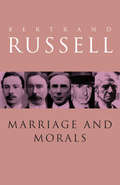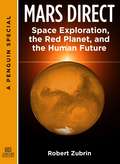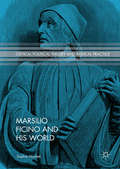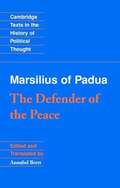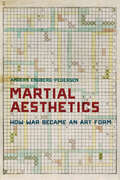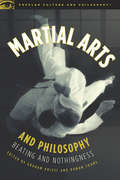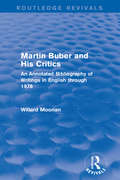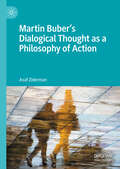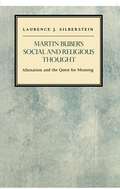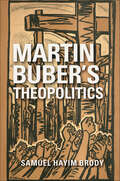- Table View
- List View
Marketisation, Ethics and Healthcare: Policy, Practice and Moral Formation (Routledge Key Themes in Health and Society)
by Andrew Papanikitas Therese Feiler Joshua HordernHow does the market affect and redefine healthcare? The marketisation of Western healthcare systems has now proceeded well into its fourth decade. But the nature and meaning of the phenomenon has become increasingly opaque amidst changing discourses, policies and institutional structures. Moreover, ethics has become focussed on dealing with individual, clinical decisions and neglectful of the political economy which shapes healthcare. This interdisciplinary volume approaches marketisation by exploring the debates underlying the contemporary situation and by introducing reconstructive and reparative discourses. The first part explores contrary interpretations of ‘marketisation’ on a systemic level, with a view to organisational-ethical formation and the role of healthcare ethics. The second part presents the marketisation of healthcare at the level of policy-making, discusses the ethical ramifications of specific marketisation measures and considers the possibility of reconciling market forces with a covenantal understanding of healthcare. The final part examines healthcare workers’ and ethicists’ personal moral standing in a marketised healthcare system, with a view to preserving and enriching virtue, empathy and compassion. Chapters 4 and 7 of this book are freely available as downloadable Open Access PDFs at http://www.taylorfrancis.com under a Creative Commons Attribution-Non Commercial-No Derivatives (CC-BY-NC-ND) 4.0 license.
Markets with Limits: How the Commodification of Academia Derails Debate
by James Stacey TaylorIn Markets with Limits James Stacey Taylor argues that current debates over the moral limits of markets have derailed. He argues that they focus on a market-critical position that almost nobody holds: That certain goods and services can be freely given away but should never be bought or sold. And he argues that they focus on a type of argument for this position that there is reason to believe that nobody holds: That trade in certain goods or services is wrongful solely because of what it would communicate. Taylor puts the debates over the moral limits of markets back on track. He develops a taxonomy of the positions that are actually held by critics of markets, and clarifies the role played in current moral and political philosophy by arguments that justify (or condemn) certain actions owing in part to what they communicate. Taylor argues that the debates have derailed because they were conducted in accord with market, rather than academic, norms—and that this demonstrates that market thinking should not govern academic research. Markets with Limits concludes with suggestions as to how to encourage academics to conduct research in accord with academic norms and hence improve its quality. Key features Provides original suggestions concerning how to improve the exegetical quality of academic research Systematically identifies the primary exegetical errors—and the ways in which these errors have adversely influenced current debates—that Jason Brennan and Peter Jaworski made in their influential book, Markets Without Limits Argues that despite the current, widespread view that semiotic objections to markets are widespread in the literature, they are in actuality rare to nonexistent Offers an up-to-date taxonomy of the current arguments in the various debates over both the ontological and the moral limits of markets Provides an extensive overview of mistaken claims that have been made and propagated in various academic literatures
Markets without Limits: Moral Virtues and Commercial Interests
by Jason F. Brennan Peter JaworskiMay you sell your vote? May you sell your kidney? May gay men pay surrogates to bear them children? May spouses pay each other to watch the kids, do the dishes, or have sex? Should we allow the rich to genetically engineer gifted, beautiful children? Should we allow betting markets on terrorist attacks and natural disasters? Most people shudder at the thought. To put some goods and services for sale offends human dignity. If everything is commodified, then nothing is sacred. The market corrodes our character. Or so most people say. In Markets without Limits, Jason Brennan and Peter Jaworski give markets a fair hearing. The market does not introduce wrongness where there was not any previously. Thus, the authors claim, the question of what rightfully may be bought and sold has a simple answer: if you may do it for free, you may do it for money. Contrary to the conservative consensus, they claim there are no inherent limits to what can be bought and sold, but only restrictions on how we buy and sell.
Markets without Limits: Moral Virtues and Commercial Interests
by Jason F. Brennan Peter JaworskiMay you sell your spare kidney? May gay men pay surrogates to bear them children? Should we allow betting markets on terrorist attacks and natural disasters? May spouses pay each other to do the dishes, watch the kids, or have sex? Should we allow the rich to genetically engineer gifted, beautiful children? May you ever sell your vote? Most people—and many philosophers—shudder at these questions. To put some goods and services for sale offends human dignity. If everything is commodified, then nothing is sacred. The market corrodes our character. In this expanded second edition of Markets without Limits, Jason Brennan and Peter M. Jaworski say it is now past time to give markets a fair hearing. The market does not, the authors claim, introduce wrongness where there was not any previously. Thus, the question of what rightfully may be bought and sold has a simple answer: if you may do it for free, you may do it for money. Contrary to the conservative consensus, Brennan and Jaworski claim there are no inherent limits to what can be bought and sold, but only restrictions on how we buy and sell. Key Updates and Revisions to the Second Edition: Includes revised introductory chapters to further clarify what’s at stake in the commodification debate. Provides easier-to-follow chapters on semiotic objections, stronger analyses of these objections, and more evidence of these objections’ widespread pervasiveness. Offers cogent responses to several recent papers that have raised counterexamples to the authors’ thesis. Includes new empirical evidence on the ways markets sometimes crowd in virtue and altruism. Analyzes the topics of blackmail and "associative" objections to markets. Includes new material on issues surrounding exploitation and coercion, selling citizenship, residency rights, and arguments about "dignity" as objections to markets.
Markets, Constitutions, and Inequality (Critical Studies in Jurisprudence)
by Anna Chadwick, Eleonora Lozano-Rodríguez, Andrés Palacios-Lleras, and Javier SolanaThis interdisciplinary collection examines the significance of constitutions in setting the terms and conditions upon which market economies operate. With some important exceptions, most notably from the tradition of Latin American constitutionalism, scholarship on constitutional law has paid negligible attention to questions of how constitutions relate to economic phenomena. A considerable body of literature has debated the due limits of the exercise of executive and legislative power, and discussions about legitimacy, democracy, and the adjudication of rights (civil and political, and socioeconomic) abound, yet scant attention has been paid by constitutional lawyers to the ways in which constitutions may protect and empower economic actors, and to how constitutions might influence the regulation and governance of specific markets. The contributors to this collection mobilize insights from other disciplines – including economic theory, history, and sociology – and consider the relationship between constitutional frameworks and bodies of law – including property law, criminal law, tax law, financial regulation, and human rights law – to advance understanding of how constitutions relate to markets and to the political economy. This book’s analysis of the role constitutions play in shaping markets will appeal to scholars and students in law, economics, history, politics, and sociology.
Markets, Ethics, and Business Ethics
by Steven ScaletThis book introduces a study of ethics and values to develop a deeper understanding of markets, business, and economic life. Its distinctive features include a thorough integration of personal and institutional perspectives; applied ethics and political philosophy; and philosophy, business, and economics.Part I introduces a study of markets, property rights, and law. Part II examines the purpose and responsibilities of corporations. Parts III and IV analyze economic life through the ethics and values of welfare and efficiency, liberty, rights, equality, desert, personal character, community, and the common good.This Third Edition maintains the strengths of previous editions – short, digestible chapters and engaging writing that explains challenging ideas clearly. The material is easily adaptable with suggested course outlines, separable chapters, and flexible applications to case studies. This book is designed for interdisciplinary programs in philosophy, politics, and economics (PPE), as well as courses in business ethics.Updates to the Third Edition include: addition of a new introductory chapter on the value of an ethical life coverage of artifical intelligence (AI) developments, including copyrights and patent implications, social media companies and corporate social responsibility, ethical differences between AI and human personality, and impacts on meaningful work integration of recent scholarship, bringing discussions and references up to date improvement of the writing across all chapters, making the book easier to read addition of new material on the is-ought gap in Chapter 1 with revised discussion of personal and institutional points of view editing and repositioning of consequentialist and deontological ethics in Chapter 3 revision of appendix for instructors that includes different syllabi possibilities for different types of courses The eBook of the Third Edition now includes hyperlinks (1) between when a term is first used in the main text and its definition in the Glossary and (2) between germane sections when they are cross-referenced.Cover image: Gary Yeowell/Getty Images
Markets, Ethics, and Business Ethics (2nd Edition)
by Steven Scalet<p>This book introduces a study of ethics and values to develop a deeper understanding of markets, business, and economic life. Its distinctive feature is its thorough integration across personal and institutional perspectives; across applied ethics and political philosophy; and across philosophy, business, and economics. <p>Part 1 studies markets, property rights, and law, and introduces normative theories with many applications. Part 2 examines the purpose of corporations and their responsibilities. Parts 3 and 4 analyze business and economic life through the ethics and values of welfare and efficiency, liberty, rights, equality, desert, personal character, community, and the common good. <p>This second edition maintains the strengths of the first edition—short, digestible chapters and engaging writing that explains challenging ideas clearly. The material is user-friendly, with an emphasis on a strong theoretical core. Easily adaptable to the instructor’s teaching, the chapters are separable and can be shaped to the interests of the instructor with suggested course outlines and flexible application to case studies. This text is designed both for coursework in business ethics, as well as interdisciplinary programs in philosophy, politics, economics, and law. This second edition: <p> <li>revises presentation of eight normative theories, with increased emphasis on linksto business and economic life <li>incorporates recent scholarship on shareholder/stakeholder debates about the purpose of corporations, bringing this important topic up to date <li>includes a new, streamlined preface that provides a quick overview of the book before smoothly guiding the reader to the first chapter <li>uses updated examples and applications <li>revamps a useful appendix, including enhancing the popular primer on ethics <li>includes Key Terms, Discussion Questions, Biographies, and Lists of Further Readings at the end of each chapter <li>includes a new ending chapter on the value of an ethical life
Markets, Minds, and Money: Why America Leads the World in University Research
by Miguel UrquiolaA colorful history of US research universities, and a market-based theory of their global success. American education has its share of problems, but it excels in at least one area: university-based research. That’s why American universities have produced more Nobel Prize winners than those of the next twenty-nine countries combined. Economist Miguel Urquiola argues that the principal source of this triumph is a free-market approach to higher education. Until the late nineteenth century, research at American universities was largely an afterthought, suffering for the same reason that it now prospers: the free market permits institutional self-rule. Most universities exploited that flexibility to provide what well-heeled families and church benefactors wanted. They taught denominationally appropriate materials and produced the next generation of regional elites, no matter the students’—or their instructors’—competence. These schools were nothing like the German universities that led the world in research and advanced training. The American system only began to shift when certain universities, free to change their business model, realized there was demand in the industrial economy for students who were taught by experts and sorted by talent rather than breeding. Cornell and Johns Hopkins led the way, followed by Harvard, Columbia, and a few dozen others that remain centers of research. By the 1920s the United States was well on its way to producing the best university research. Free markets are not the solution for all educational problems. Urquiola explains why they are less successful at the primary and secondary level, areas in which the United States often lags. But the entrepreneurial spirit has certainly been the key to American leadership in the research sector that is so crucial to economic success.
Markets, Morals, Politics: Jealousy of Trade and the History of Political Thought
by Béla KapossyWhen István Hont died in 2013, the world lost a giant of intellectual history. A leader of the Cambridge School of Political Thought, Hont argued passionately for a global-historical approach to political ideas. To better understand the development of liberalism, he looked not only to the works of great thinkers but also to their reception and use amid revolution and interstate competition. His innovative program of study culminated in the landmark 2005 book Jealousy of Trade, which explores the birth of economic nationalism and other social effects of expanding eighteenth-century markets. Markets, Morals, Politics brings together a celebrated cast of Hont’s contemporaries to assess his influence, ideas, and methods. Richard Tuck, John Pocock, John Dunn, Raymond Geuss, Gareth Stedman Jones, Michael Sonenscher, John Robertson, Keith Tribe, Pasquale Pasquino, and Peter N. Miller contribute original essays on themes Hont treated with penetrating insight: the politics of commerce, debt, and luxury; the morality of markets; and economic limits on state power. The authors delve into questions about the relationship between states and markets, politics and economics, through examinations of key Enlightenment and pre-Enlightenment figures in context—Hobbes, Rousseau, Spinoza, and many others. The contributors also add depth to Hont’s lifelong, if sometimes veiled, engagement with Marx. The result is a work of interpretation that does justice to Hont’s influence while developing its own provocative and illuminating arguments. Markets, Morals, Politics will be a valuable companion to readers of Hont and anyone concerned with political economy and the history of ideas.
Marking Time: On the Anthropology of the Contemporary
by Paul RabinowIn Marking Time, Paul Rabinow presents his most recent reflections on the anthropology of the contemporary. Drawing richly on the work of Michel Foucault, John Dewey, Niklas Luhmann, and, most interestingly, German painter Gerhard Richter, Rabinow offers a set of conceptual tools for scholars examining cutting-edge practices in the life sciences, security, new media and art practices, and other emergent phenomena. Taking up topics that include bioethics, anger and competition among molecular biologists, the lessons of the Drosophila genome, the nature of ethnographic observation in radically new settings, and the moral landscape shared by scientists and anthropologists, Rabinow shows how anthropology remains relevant to contemporary debates. By turning abstract philosophical problems into real-world explorations and offering original insights, Marking Time is a landmark contribution to the continuing re-invention of anthropology and the human sciences.
Marking the Centenary of Samuel Alexander's Space, Time and Deity (History of Analytic Philosophy)
by A. R. J. FisherThis book is an edited collection of essays in celebration of the centenary of Samuel Alexander’s Space, Time and Deity, published in 1920. Samuel Alexander (1859-1938) was a leading figure of British philosophy in the early twentieth century. He was partly responsible for the ‘new realism’ movement along with G.E. Moore and Bertrand Russell. However, his work has been overlooked in developments of twentieth century philosophy and yet his theories and style of theorising are in vogue. This book begins with three previously unpublished papers by Alexander that shed light on his metaphysical commitments about time, universals, God, knowledge of past truths, grounding, and inference in logic and science. There are also two important posthumous chapters by philosophers of the mid-twentieth century, who elaborate on his life and most significant contributions. The second half of the book contains new essays by current scholars, discussing Alexander on metaphysical realism, idealism, naturalism, space and time, process ontology, ontological categories, epistemology, perception, philosophy of history, emergentism, and empiricism.
Markus Gabriel’s New Realism (Synthese Library #492)
by Jan VoosholzThis is the first volume focused on Markus Gabriel’s version of New Realism, which spans the fields of metaphysics/ontology, philosophy of mind, epistemology, philosophy of science, and meta-philosophy. Most of the selected contributions are directly or indirectly concerned with Gabriel’s fields of sense-ontology, his version of a thoroughly realistic pluralism. While some take up criticisms from previous debates surrounding Gabriel’s philosophy and New Realism in general, others advance completely new and innovative challenges for this highly systematic thinker. Overall, the contributions provide both a substantive commentary on Gabriel’s work and a multifaceted, critical assessment of its underlying ideas. The book is not only an essential addition to the debate surrounding New Realism, but also furthers the discussions about naturalism, deflationist ontologies, contextualism and mereological arguments to which Gabriel’s work has contributed in recent years.
Marranos: The Other of the Other
by Donatella Di CesareMarranos were Spanish or Portuguese Jews who converted to Christianity at the time of the Spanish Inquisition to avoid being massacred or forced to flee but who continued to practise Judaism in secret. They were persecuted by the first racist blood laws but the water of forced baptism was not enough to make them assimilate. Donatella Di Cesare sees the marranos as the quintessential figures of the modern condition: the marranos were not just those whom modernity cast out as the ‘other’, but were those ‘others’ who were forced to disavow their beliefs and conceal themselves. They became ‘the other of the other’, doubly excluded, condemned to a life of existential duplicity with no way out, spurned by both Catholics and Jews and unable to belong fully to either community. But this double life of the marranos turned out to be a secret source of strength. Doubly estranged, with no possibility of redemption, the marranos became modernity’s first true radicals. Dissidents out of necessity, they inaugurated modernity with their ambivalence and their split self. And their story is not over. By treating the history of the marranos as a prism through which to grasp the defining features of modernity, this highly original book will be of interest to a wide readership.
Marriage and Morals (Routledge Classics Ser.)
by Bertrand RussellMarriage and Morals is a compelling cross-cultural examination of individual, familial and societal attitudes towards sex and marriage. By exploring the codes by which we live our sexual lives and conventional morality, Russell daringly sets out a new morality, shaped and influenced by dramatic changes in society such as the emancipation of women and the wide-spread use of contraceptives. From the origin of marriage to the influence of religion, Russell explores the changing role of marriage and codes of sexual ethics. The influence of this great work has turned it into a worthy classic.
Marriage and Morals: Marriage And Moral
by Bertrand RussellFirst published in 1985. Marriage and Morals won Bertrand Russell the Nobel Prize for Literature in 1950. With his customary wit and clarity, Russell explores the changing role of marriage, the codes of sexual ethics and the question of population. By what codes should we live our sexual lives? Every aspect, from the origin of marriage to the values of a healthy sex life, from the influence of religion, psychoanalysis and taboos to the possibilities of eugenics, receives the incisive scrutiny of Russell’s intellect. Here is the Passionate Sceptic at his most vigorous.
Mars Direct
by Robert ZubrinThe human race is at a crossroads. In the coming years, we will make decisions regarding our human spaceflight program that will lead to one of two familiar futures: the open universe of Star Trek, where we allow ourselves the opportunity to spread our wings and attempt to flourish as an interplanetary species-or the closed, dystopian, and ultimately self-destructive world of Soylent Green. If we ever hope to live in the future that is the former scenario, our first stepping stone must be a manned mission to Mars. Dr. Robert Zubrin details the challenges of a manned Earth-to-Mars mission. Challenges which, according to Zubrin, we are technologically more prepared to overcome than the obstacles of the missions to the moon of the sixties and seventies. Dr. Zubrin's relatively simple plan, called Mars Direct, could feasibly have humans on the surface of Mars within a decade. Zubrin also discusses the current predicament of NASA, the promise of privatized space flight from companies like SpaceX, and the larger implication behind the absolute necessity to open the final frontier to humanity-the human race's future as a species that takes the necessary baby steps away from the cradle that is planet Earth or, ultimately, perishes here.
Marsilio Ficino and His World
by Sophia HowlettThis book makes the case for Marsilio Ficino, a Renaissance philosopher and priest, as a canonical thinker, and provides an introduction for a broad audience. Sophia Howlett examines him as part of the milieu of Renaissance Florence, part of a history of Platonic philosophy, and as a key figure in the ongoing crisis between classical revivalism and Christian belief. The author discusses Ficino's vision of a Platonic Christian universe with multiple worlds inhabited by angels, daemons and pagan gods, as well as our own distinctive role within that universe - climbing the heights to talk with angels yet constantly confused by the evidence of our own senses. Ficino as the "new Socrates" suggests to us that by changing ourselves, we can change our world.
Marsilius of Padua at the Intersection of Ancient and Medieval Traditions of Political Thought
by Vaileios SyrosThis book focuses on the reception of classical political ideas in the political thought of the fourteenth-century Italian writer Marsilius of Padua. Vasileios Syros provides a novel cross-cultural perspective on Marsilius's theory and breaks fresh ground by exploring linkages between his ideas and the medieval Muslim, Jewish, and Byzantine traditions.Syros investigates Marsilius's application of medical metaphors in his discussion of the causes of civil strife and the desirable political organization. He also demonstrates how Marsilius's demarcation between ethics and politics and his use of examples from Greek mythology foreshadow early modern political debates (involving such prominent political authors as Niccolò Machiavelli and Paolo Sarpi) about the political dimension of religion, church-state relations, and the emergence and decline of the state.
Marsilius of Padua: The Defender of the Peace
by Annabel Brett'The Defender of the Peace of Marsilius of Padua' is a massively influential text in the history of western political thought. Marsilius offers a detailed analysis and explanation of human political communities, before going on to attack what he sees as the obstacles to peaceful human coexistence.
Martial Aesthetics: How War Became an Art Form
by Anders Engberg-PedersenThe twenty-first century has witnessed a pervasive militarization of aesthetics with Western military institutions co-opting the creative worldmaking of art and merging it with the destructive forces of warfare. In Martial Aesthetics, Anders Engberg-Pedersen examines the origins of this unlikely merger, showing that today's creative warfare is merely the extension of a historical development that began long ago. Indeed, the emergence of martial aesthetics harkens back to a series of inventions, ideas, and debates in the eighteenth and early nineteenth century. Already then, military thinkers and inventors adopted ideas from the field of aesthetics about the nature, purpose, and force of art and retooled them into innovative military technologies and a new theory that conceptualized war not merely as a practical art, but as an aesthetic art form. This book shows how military discourses and early war media such as star charts, horoscopes, and the Prussian wargame were entangled with ideas of creativity, genius, and possible worlds in philosophy and aesthetic theory (by thinkers such as Leibniz, Baumgarten, Kant, and Schiller) in order to trace the emergence of martial aesthetics. Adopting an approach that is simultaneously historical and theoretical, Engberg-Pedersen presents a new frame for understanding war in the twenty-first century.
Martial Arts and Philosophy: Beating and Nothingness
by Graham Priest Damon A. YoungSocrates, an Athenian soldier, was a calmly efficient killing machine. His student Plato was an accomplished and broad-shouldered wrestler. Martial arts and philosophy have always gone hand in hand, as well as fist in throat. Philosophical argument is closely parallel with hand-to-hand combat. And all of today's Asian martial arts-like Karate, Kung-Fu, Judo, or Aikido-were developed to embody and apply philosophical ideas. The Japanese martial tradition of Budo, for instance, was influenced by the three philosophical traditions of Shinto, Confucianism, and Zen Buddhism, and these philosophies are still taught in Japanese martial arts schools all across the world. As Damon Young explains in his chapter, the Japanese martial arts customs of courtesy are derived from Shinto purity, Confucian virtues, and the loving brutality of Zen. In his interview with Bodidharma (included in the book), Graham Priest brings out aspects of Buddhist philosophy behind Shaolin Kung-Fu-how fighting monks are seeking Buddhahood, not brawls. But as Scott Farrell's chapter reveals, Eastern martial arts have no monopoly on philosophical traditions. Western chivalry is an education in and living revival of Aristotelian ethical theories. The Western martial art of fencing is explored by Nick Michaud, who looks at the morality of selfishness in fencing, and Christopher Lawrence and Jeremy Moss, who try to pin down what makes fencing unique: is it the sword, the techniques, the footwork, the aristocratic aura, or something else?Jack Fuller argues that his training in Karate was an education in Stoicism. Travis Taylor and Sasha Cooper reveal the utilitarian thinking behind Jigoro Kano's Judo. Kevin Krein maintains that the martial arts are a reply to the existentialist's anxiety about the meaninglessness of life. Patricia Peterson examines Karate's contribution to feminism, and Scott Beattie analyzes the role of space in the martial arts school. Joe Lynch pits the Western ideas of Plato against the Eastern ideas of the Shaolin monks. Bronwyn Finnigan and Koji Tanaka uncover the meaning of human action as it appears in Kendo. Rick Schubert explains the meaning of mastery in the fighting arts. Moving to ethical issues, Tamara Kohn discovers what we owe to others in Aikido. Chris Mortensen questions whether his own Buddhist pacifism is compatible with being a martial artist. In different ways, Gillian Russell and John Haffner and Jason Vogel assess the ways in which martial arts can morally compromise us. How can the sweaty and the brutal be exquisitely beautiful? Judy Saltzman looks into the curious charm of fighting and forms, with help from Friedrich Nietzsche.
Martin Buber and His Critics (Routledge Revivals): An Annotated Bibliography of Writings in English through 1978
by Willard MoonanFirst published in 1981. Martin Buber has been acclaimed as one of the major philosophical and religious thinkers of the twentieth century with his influence and achievements spanning numerous fields — however in each of these areas his work has also been severely criticised and his influence called into question. This volume brings together in a systematic arrangement all the significant material by and about Martin Buber published in English up to the centenary of his birth in 1978. To make the bibliography as useful as possible, the critical material was annotated and various indexes were constructed, including an extensive subject index to both Buber’s works and the criticism.
Martin Buber's Dialogical Thought as a Philosophy of Action
by Asaf ZidermanThe Act of Love promotes a philosophical revival of Buber’s dialogical thought by repositioning it as a philosophy of action, departing from a long-established consensus that narrowly viewed it as a post-Kantian epistemology. Based on careful analysis of his writings, the book’s main thrust is to reconstruct Buber’s argument that dialogue is the perfected form of action, and a perfect action is necessarily dialogical. This reconstruction renders Buber's dialogical thought pertinent to contemporary analytic philosophy by situating it within central discussions in the field of philosophy of action.
Martin Buber's Social and Religious Thought: Alienation and the Quest for Meaning (Modern Jewish Masters #5)
by Laurence J. Silberstein“Moore focuses on Buber’s central message about what it means to be a human being, a person of faith, and what mankind can do to overcome the eclipse of God.”-Shofar“Solid, well researched, and sympathetic…. might well spur a person to go back and read Buber.” -Commonwealth
Martin Buber's Theopolitics (New Jewish Philosophy and Thought)
by Samuel Hayim BrodyHow did one of the greatest Jewish thinkers of the 20th century grapple with the founding of Israel and the Israeli-Palestinian conflict—one of the most significant political conflicts of his time? Samuel Hayim Brody traces the development of Martin Buber's thinking and its implications for the Jewish religion, for the problems posed by Zionism, and for the Zionist-Arab conflict. Beginning in turbulent Weimar Germany, Brody shows how Buber's debates about Biblical meanings had concrete political consequences for anarchists, socialists, Zionists, Nazis, British, and Palestinians alike. Brody further reveals how Buber's passionate commitment to the rule of God absent an intermediary came into conflict in the face of a Zionist movement in danger of repeating ancient mistakes. Brody argues that Buber's support for Israel stemmed from a radically rich and complex understanding of the nature of the Jewish mission on earth that arose from an anarchist reading of the Bible.
